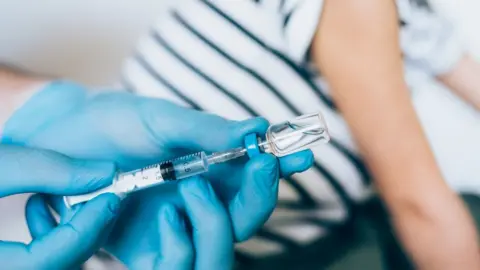Covid vaccine being tested in patients with low immunity
 Getty Images
Getty ImagesPeople with low immunity due to health conditions, including cancer, are being recruited to a study to urgently find out if coronavirus vaccines will still offer them high protection.
As the UK comes out of lockdown, it is important to know the virus risk for all populations.
Trials and real-life data show the shots work very well for most adults, including the very elderly.
But there is little evidence on efficacy in immunocompromised patients.
The coronavirus vaccines approved by UK regulators are safe and still recommended for people with weakened immune systems due to underlying health conditions or prescribed medications, including those having chemotherapy or stem-cell transplants.
In the Octave study, up to 5,000 of these patients, from around the UK, will be vaccinated as part of the NHS mass rollout.
But blood tests before and after will check their immunity levels and see how well protected they are against Covid.
The researchers should have some findings within a few months.
Full results are expected much later this year or early next.
Lead researcher Prof Iain McInnes, from the University of Glasgow, said: "We urgently need to understand if patient populations with chronic conditions such as cancer, inflammatory arthritis and kidney and liver disease are likely to be well-protected by current Covid-19 vaccines.
"The Octave study will give us invaluable new data to help us answer questions of this kind from our patients and their families."
The British Society for Immunology said: "While Covid-19 vaccination might provide a lower level of protection in people who are immunosuppressed or immunocompromised compared with the rest of the population, it is still very important that you get vaccinated, as it will offer you a certain amount of protection.
"It is important that you receive two doses of the vaccine to maximise the protection that vaccination offers you."

- LOOK-UP TOOL: How many cases in your area?
- LOCKDOWN RULES: What are they and when will they end?
- YOUR QUESTIONS: We answer your queries
- GLOBAL SPREAD: How many worldwide cases are there?
- TREATMENTS: What progress are we making to help people?

